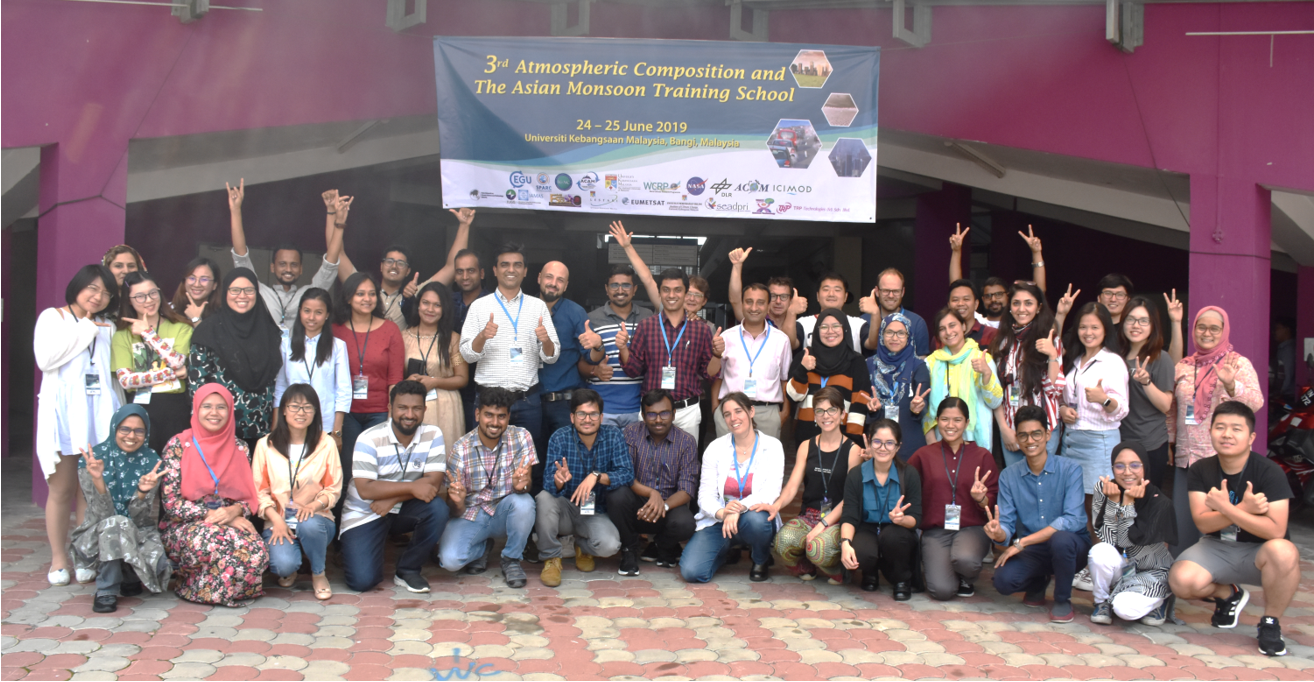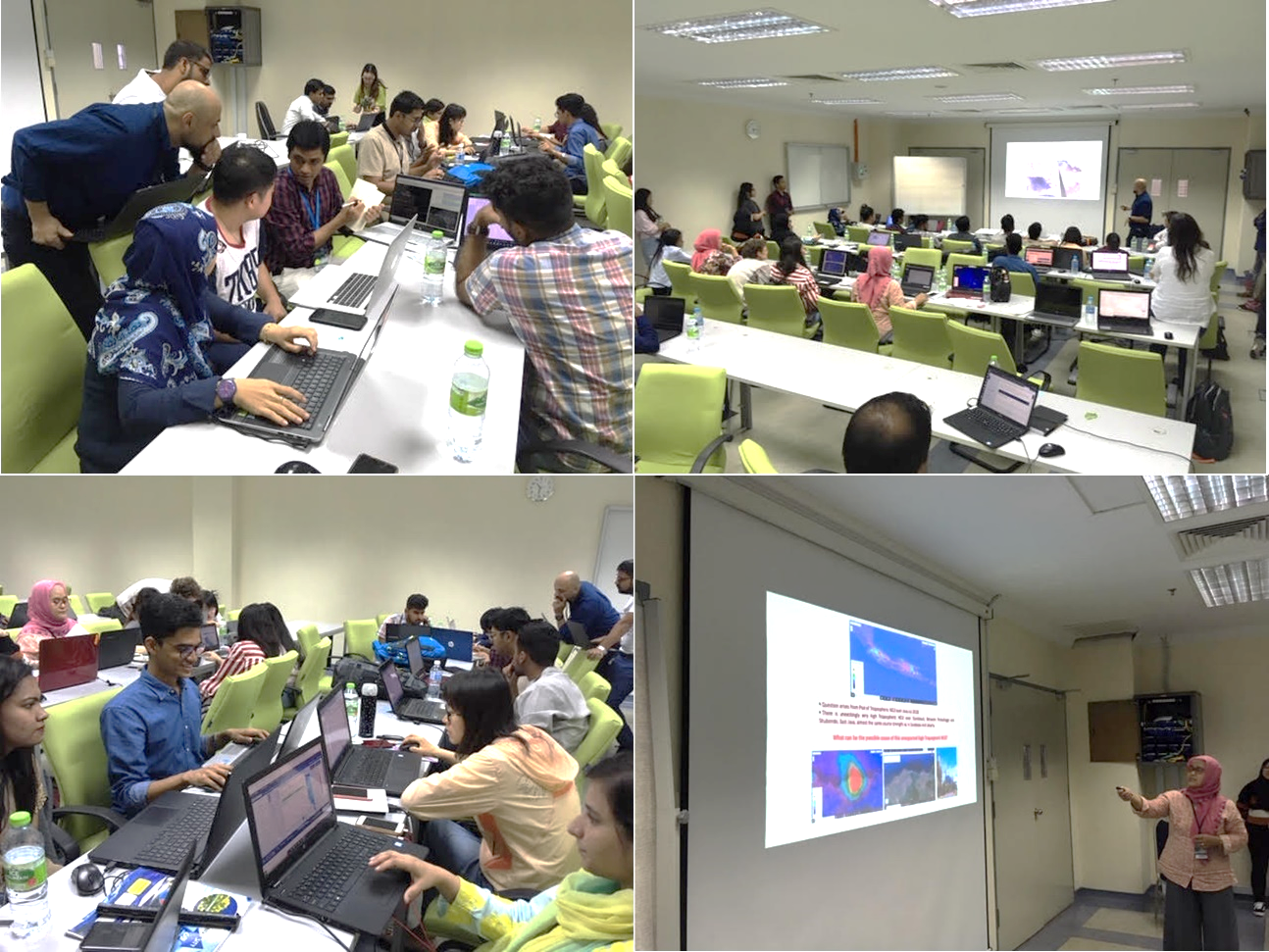Kuala Lumpur 2019 Training School
Third ACAM Training School
24-25 June 2019, Universiti Kebangsaan Malaysia
Report from ACAM Working Group on Capacity Building
Co-Leads: Ritesh Gautam (EDF), Federico Fierli (EUMETSAT), Bhupesh Adhikary (ICIMOD)
The 3rd Atmospheric Composition and Asian Monsoon (ACAM) Training School (24-25 June 2019) was held at the Universiti Kebangsaan Malaysia (UKM), in conjunction with the 4th ACAM Workshop (26-28 June). The training school was organized as part of ACAM’s working group on capacity building related to satellite observations and model data applications in Asia, specifically in the area of atmospheric composition data analysis. This year’s theme at the school was “Satellite Observations and Analysis of Atmospheric Chemistry and Aerosols in the Asian Monsoon region”.

The 2-day event included lectures, computer-based tutorials and mini-projects using latest and comprehensive global satellite and reanalysis datasets on atmospheric composition, focusing on research problems in Asia. The school was attended by 37 early career scientists including graduate students and postdocs from 15 countries, selected from a pool of ~140 applications. Participants represented not only wide geographic diversity but also multi-institutional and multi-disciplinary backgrounds. Each training school participant also attended the following ACAM workshop which gave them a suitable opportunity to learn about ACAM related science and data prior to the workshop, in turn facilitating networking with peers and lecturers during the week.

A large focus of the school included live demonstration of satellite datasets and open source platforms/scripts to read, visualize and analyze multi-dimensional data. The various satellite and reanalysis datasets included TROPOMI (CO, NO2 and SO2 products), GOME (NO2), MODIS (aerosol), CALIPSO (vertical aerosol profile) and Copernicus Atmospheric Monitoring Service (CAMS trace gas products). An introductory live webinar was conducted prior to the event to provide overview about the format of the school and introduce the multi-sensor satellite data products. Specific information about the datasets and analysis platforms were uploaded on EUMETSAT’s e-learning platform, prior to the training event; where participants actively engaged in gaining familiarity with the datasets and proposed candidate mini-projects based on their research interests.
Lecturers at the school included Ilse Aben (SRON, Netherlands), Bhupesh Adhikary (ICIMOD, Nepal), Silvia Bucci (LMD, France), Federico Fierli (EUMETSAT, EU), Ritesh Gautam (EDF, US), Laura Pan (NCAR, US), Amit Pandit (NASA Langley, US) and Mark Parrington (ECMWF, UK).
After the science lectures and computer-based tutorials on day 1, participants worked in groups to implement small-scale science projects focusing on NO2 hotspot analysis linked to urban and fire emissions using TROPOMI and GOME data, dust and smoke characterization including transport and vertical distribution analysis using MODIS and CALIPSO data, respectively, and model-satellite intercomparison of trace gases distribution over Asia using the CAMS platform. The training school concluded by group presentations with participants summarizing their scientific findings and their experience with data and tools. Some of the freely available open-source tools used were Google Earth Engine and Python scripts to read and analyze the aforementioned datasets. A separate breakout discussion centered on capacity building, after the school, highlighted increasing interest in the ACAM community to employ satellite and model data applications in Asia - with feedback for improved interpretation of satellite data including data uncertainties, statistical analysis as well as atmospheric instrumentation along with related measurement protocols in ensuring robustness and accuracy of field-collected data. This working group will strive to address and include these topics in future editions of ACAM training school and share related opportunities in other training networks with the ACAM community.
The organization of training school would not have been possible without the extensive logistics support from the local organizing team led by Prof. Talib Latif and Dr. Fatimah Ahamad from UKM. We would be remiss not to mention the generous financial support from various sponsoring organizations that enabled participation of the trainees and some lecturers at the school. These sponsors include IGAC, EUMETSAT, ICIMOD, EGU, SPARC, iCACGP, NASA. We thank the various sponsors and local organizers for their thoughtful support.
Information about previous ACAM Training Schools in Bangkok (2015) and Guangzhou (2017) can be found at the links below.
Guangzhou 2017 Training school
Bangkok 2015 Training School